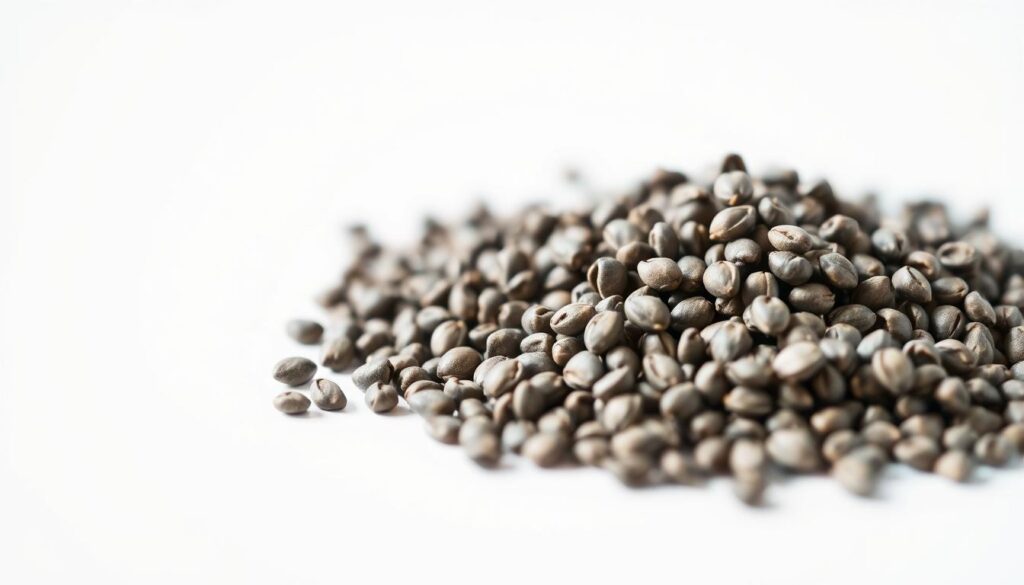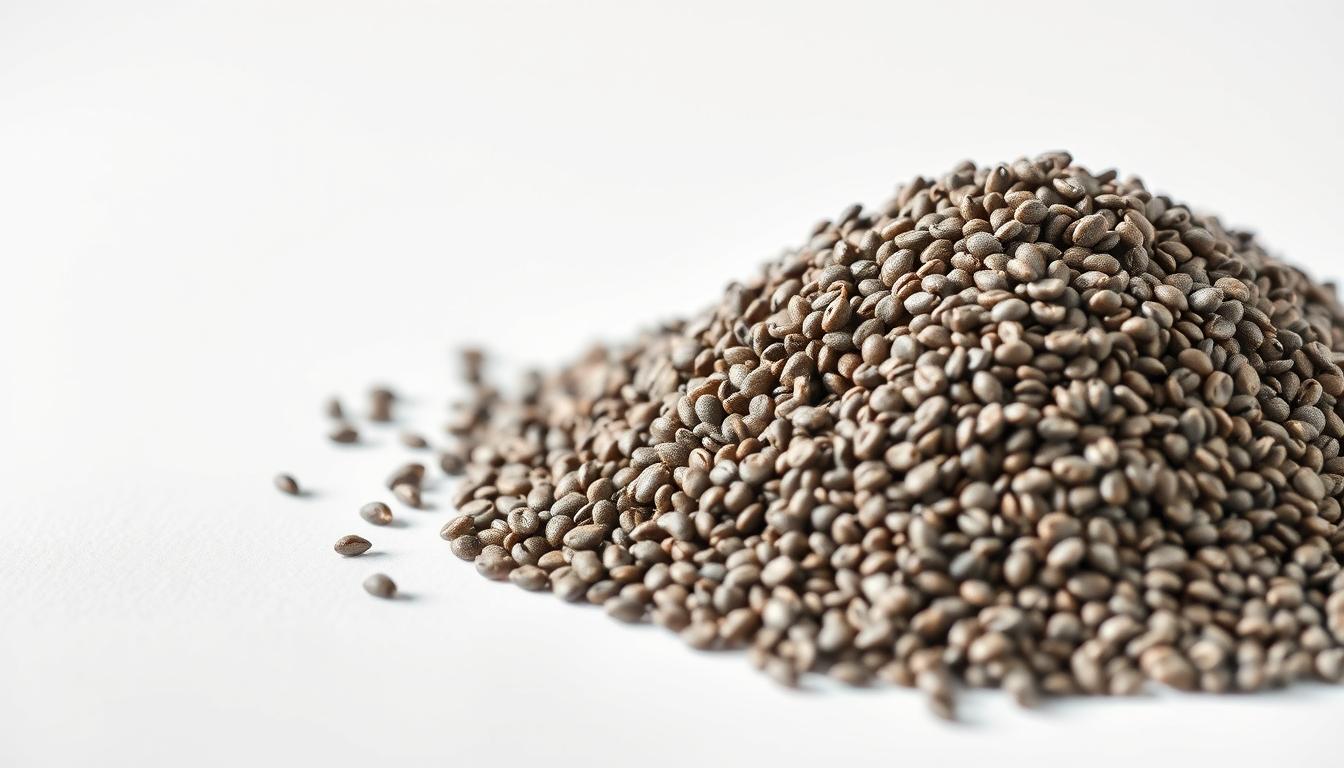Did you know that chia seeds were a staple food for the ancient Aztecs and Mayans, revered for their incredible nutritional value? These tiny seeds pack a powerful punch when it comes to chia seeds nutrition, offering a rich source of fiber, protein, and omega-3 fatty acids.
Recognized as a superfood, chia seeds have gained popularity worldwide for their versatility and health-enhancing properties. Incorporating chia seeds into your diet can be a simple yet effective way to boost your overall well-being.
Key Takeaways
- Rich in fiber, protein, and omega-3 fatty acids
- Supports heart health and digestion
- May help lower cholesterol levels
- High in antioxidants
- Can be easily incorporated into various meals
- Supports healthy blood sugar levels
What Are Chia Seeds?
Chia seeds, once revered by ancient civilizations for their nutritional and medicinal properties, are now gaining global recognition for their health benefits. Originating from the deserts of Central America, these tiny seeds were a staple food for the Aztecs and Mayans, who valued them for their nutritional and energy-boosting properties.
Origin and History
The history of chia seeds dates back to the ancient Mayan and Aztec cultures, where they were considered a superfood. These cultures not only consumed chia seeds as a source of nutrition but also used them in rituals and as a form of currency.
Nutritional Profile at a Glance
Chia seeds are rich in nutrients, including fiber, protein, and omega-3 fatty acids. Here’s a snapshot of their nutritional profile:
| Nutrient | Amount per Ounce |
|---|---|
| Fiber | 10 grams |
| Protein | 4 grams |
| Omega-3 Fatty Acids | 4915 mg |

With their rich history and impressive nutritional profile, chia seeds are a valuable addition to a healthy diet. Research into chia seeds nutrition continues to uncover their potential health benefits, making them a popular choice among health-conscious individuals.
The Health Benefits of Chia Seeds
The nutritional profile of chia seeds is impressive, offering a multitude of health benefits that have been backed by research. Chia seeds are rich in antioxidants, fiber, and omega-3 fatty acids, making them an excellent addition to a healthy diet.
Overview of Research-Backed Benefits
Studies have shown that chia seeds can support heart health by reducing inflammation and improving blood lipid profiles. The high fiber content in chia seeds also promotes digestive health and can help with satiety, making them beneficial for weight management.
- Rich in Antioxidants: Chia seeds contain a high amount of antioxidants, which help protect against oxidative stress and inflammation.
- Supports Heart Health: The omega-3 fatty acids in chia seeds contribute to heart health by reducing triglycerides and blood pressure.
- Promotes Digestive Health: The fiber in chia seeds aids in digestion and can help prevent constipation.
How Chia Seeds Earned Their Superfood Status
Chia seeds have earned their superfood status due to their dense nutrient profile and versatility in cooking. They are a rich source of essential vitamins and minerals, including calcium, magnesium, and potassium.
As a superfood, chia seeds are not only nutritious but also easy to incorporate into daily meals. They can be added to smoothies, oatmeal, or yogurt, making them a convenient and healthy choice.
Chia Seeds as a Nutritional Powerhouse
Chia seeds are a nutritional powerhouse, providing a rich source of protein, vitamins, and minerals that support overall health.
Protein Content and Amino Acid Profile
Chia seeds are an excellent source of plant-based protein, containing about 4-5 grams of protein per ounce. They provide a complete amino acid profile, making them a valuable protein source for vegetarians and vegans.
The amino acids in chia seeds support various bodily functions, including muscle repair and growth. The protein content in chia seeds is particularly beneficial for those looking to increase their protein intake without consuming animal products.
Essential Vitamins and Minerals
Chia seeds are rich in essential vitamins and minerals, including calcium, magnesium, and potassium. These nutrients play crucial roles in maintaining bone health, supporting muscle function, and regulating blood pressure.
| Nutrient | Amount per Ounce | % Daily Value |
|---|---|---|
| Protein | 4-5 grams | 8-10% |
| Calcium | 180-200 mg | 18-20% |
| Magnesium | 95-100 mg | 24-25% |
| Potassium | 400-450 mg | 10-12% |
Omega-3 Fatty Acids in Chia Seeds
Chia seeds stand out as a rich source of alpha-linolenic acid (ALA), a type of omega-3 fatty acid. Unlike fish-based sources of omega-3s, such as salmon or sardines, which contain EPA and DHA, chia seeds provide a plant-based ALA that is crucial for heart health.
ALA vs. Other Omega-3 Sources
While EPA and DHA are directly utilized by the body, ALA needs to be converted into these forms. However, chia seeds offer a sustainable and vegan-friendly alternative to traditional omega-3 sources. The ALA in chia seeds supports heart health by potentially lowering triglycerides and reducing inflammation.
Heart Health and Anti-Inflammatory Effects
The omega-3s in chia seeds contribute to heart health by supporting healthy blood lipid profiles and reducing inflammation. This can lead to a reduced risk of cardiovascular diseases.
| Omega-3 Source | Type of Omega-3 | Primary Benefits |
|---|---|---|
| Chia Seeds | ALA | Heart Health, Anti-Inflammatory |
| Salmon | EPA, DHA | Heart Health, Brain Function |
| Flaxseeds | ALA | Heart Health, Digestive Health |
Incorporating chia seeds into your diet can be a valuable step towards supporting heart health and reducing inflammation, thanks to their rich ALA content.
Fiber Content and Digestive Health
Chia seeds are a powerhouse of fiber, contributing significantly to a healthy digestive system. The fiber content in chia seeds includes both soluble and insoluble fiber, each playing a unique role in maintaining digestive health.
Soluble vs. Insoluble Fiber in Chia
Chia seeds contain a mix of soluble and insoluble fiber. Soluble fiber forms a gel-like substance in the stomach, slowing down digestion and aiding in the absorption of nutrients. On the other hand, insoluble fiber adds bulk to stool, promoting regular bowel movements and preventing constipation.
| Fiber Type | Function | Benefits |
|---|---|---|
| Soluble Fiber | Forms gel-like substance, slows digestion | Aids nutrient absorption, lowers cholesterol |
| Insoluble Fiber | Adds bulk to stool, promotes bowel movements | Prevents constipation, supports healthy gut |
Gut Microbiome Benefits
The fiber in chia seeds acts as a prebiotic, feeding the good bacteria in the gut, thereby supporting a healthy gut microbiome. A balanced gut microbiome is crucial for overall health, influencing everything from digestion to immune function.
Incorporating chia seeds into your diet can have a significant impact on your digestive health, thanks to their rich fiber content. By supporting both soluble and insoluble fiber benefits, chia seeds promote a healthy digestive system and contribute to overall well-being.
Chia Seeds for Weight Management
Chia seeds are increasingly recognized for their benefits in promoting satiety and aiding weight loss. The unique combination of fiber, protein, and healthy fats in chia seeds makes them an effective tool for managing weight.
How Chia Seeds Promote Satiety
The high fiber content in chia seeds absorbs water, expanding in the stomach to create a feeling of fullness. This mechanism helps reduce overall calorie intake by delaying gastric emptying and slowing the release of glucose into the bloodstream. As a result, chia seeds can help curb unnecessary snacking and support a more balanced diet.
Incorporating Chia in Weight Loss Plans
To effectively incorporate chia seeds into a weight loss plan, start by adding them to your daily meals. Mix chia seeds with water or almond milk to create a gel-like texture that can be used as an egg substitute in recipes or as a topping for salads and yogurt. You can also sprinkle chia seeds on oatmeal or blend them into smoothies. Aim to consume about 1-2 tablespoons of chia seeds per day to reap their weight management benefits.
How to Add Chia Seeds to Your Diet
Chia seeds are a versatile ingredient that can be easily added to a variety of dishes to enhance their nutritional value. They can be incorporated into meals in various forms, making them a convenient addition to a healthy diet.
Basic Preparation Methods
To get started with chia seeds, it’s essential to understand the basic preparation methods. Two common techniques include soaking and grinding chia seeds.
Soaking Chia Seeds
Soaking chia seeds in water or another liquid makes them gel-like, which can be a great addition to breakfast cereals or smoothies. Simply mix chia seeds with your chosen liquid and let it sit for a few minutes.
Grinding Chia Seeds
Grinding chia seeds can help release their nutrients, making them easier to digest. You can grind chia seeds in a spice grinder or coffee grinder and then add the ground chia to your recipes.
Delicious Chia Seed Recipes
Chia seeds can be used in a variety of recipes across different meal categories.
Breakfast Options
Try adding chia seeds to your oatmeal or yogurt for a nutritious breakfast. You can also make chia seed pudding by soaking chia seeds in almond milk and then topping it with fruits.
Snacks and Desserts
Chia seed energy balls made with chia seeds, nuts, and dried fruits are a healthy snack option. You can also use chia seeds to make vegan desserts like chia seed pudding with cocoa powder.
Beverages and Smoothies
Adding chia seeds to your smoothies can boost their nutritional content. You can also make a chia seed-infused water by soaking chia seeds in water and then straining it.
Recommended Daily Intake
The recommended daily intake of chia seeds is about 1-2 tablespoons. Starting with a small amount and gradually increasing it can help your digestive system adjust.
| Meal | Chia Seed Addition | Benefits |
|---|---|---|
| Breakfast | Add to oatmeal or yogurt | Boosts fiber and omega-3 intake |
| Snacks | Make energy balls or puddings | Provides sustained energy and satiety |
| Beverages | Add to smoothies or make chia seed water | Enhances hydration and nutrient intake |
Embracing Chia Seeds for a Healthier You
Chia seeds have emerged as a superfood, offering numerous health benefits that can significantly enhance overall well-being. Rich in omega-3 fatty acids, fiber, protein, and essential minerals, chia seeds provide a nutritional boost that can support heart health, digestive health, and weight management.
Incorporating chia seeds into your diet can be simple and delicious. By adding them to your meals, you can reap the rewards of their nutritional profile. The health benefits of chia seeds are backed by research, solidifying their status as a chia seeds superfood that can be a valuable addition to a healthy lifestyle.
As you explore ways to improve your diet, consider making chia seeds a regular part of your routine. With their versatility and nutritional benefits, chia seeds can be a great step towards achieving your health goals.
